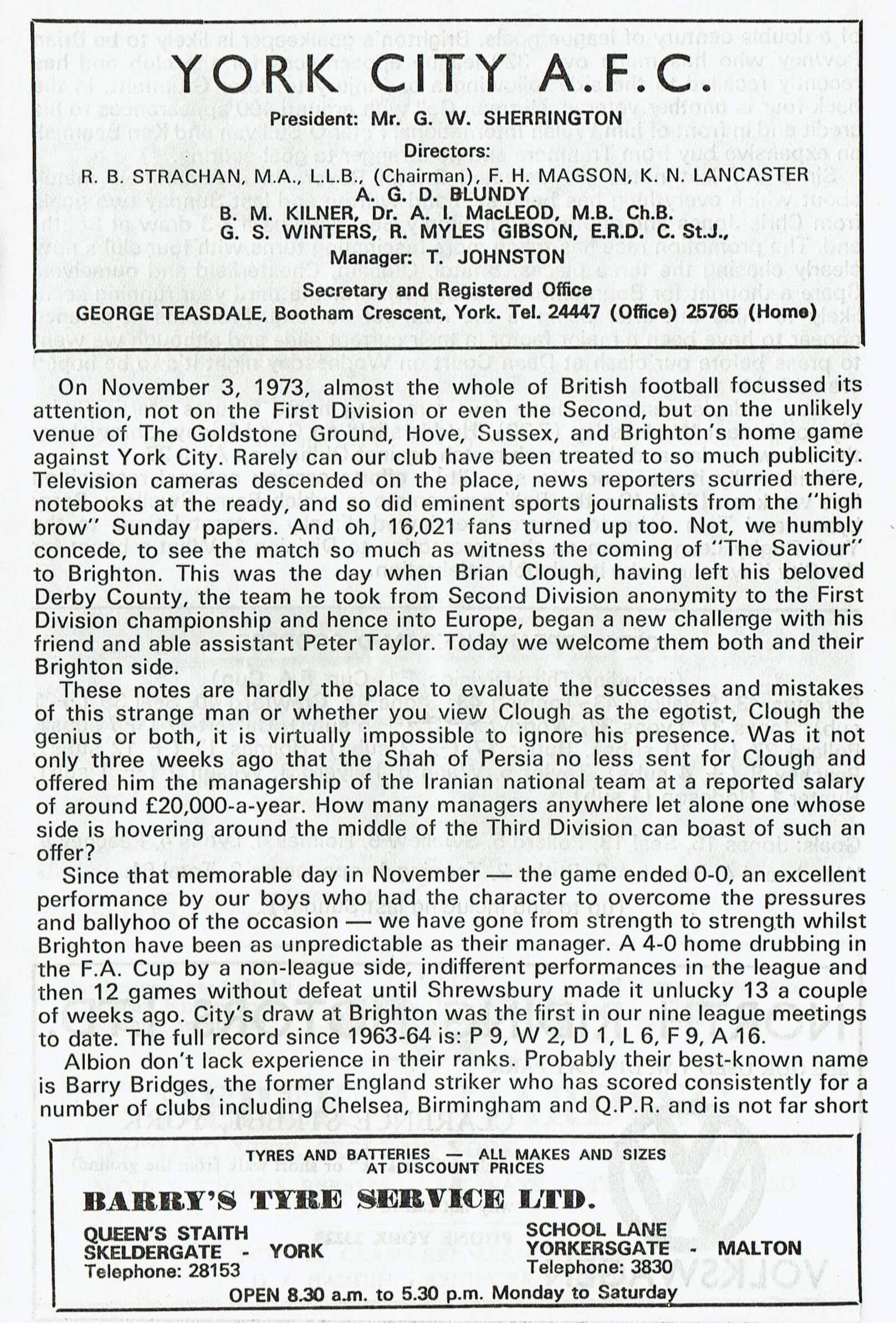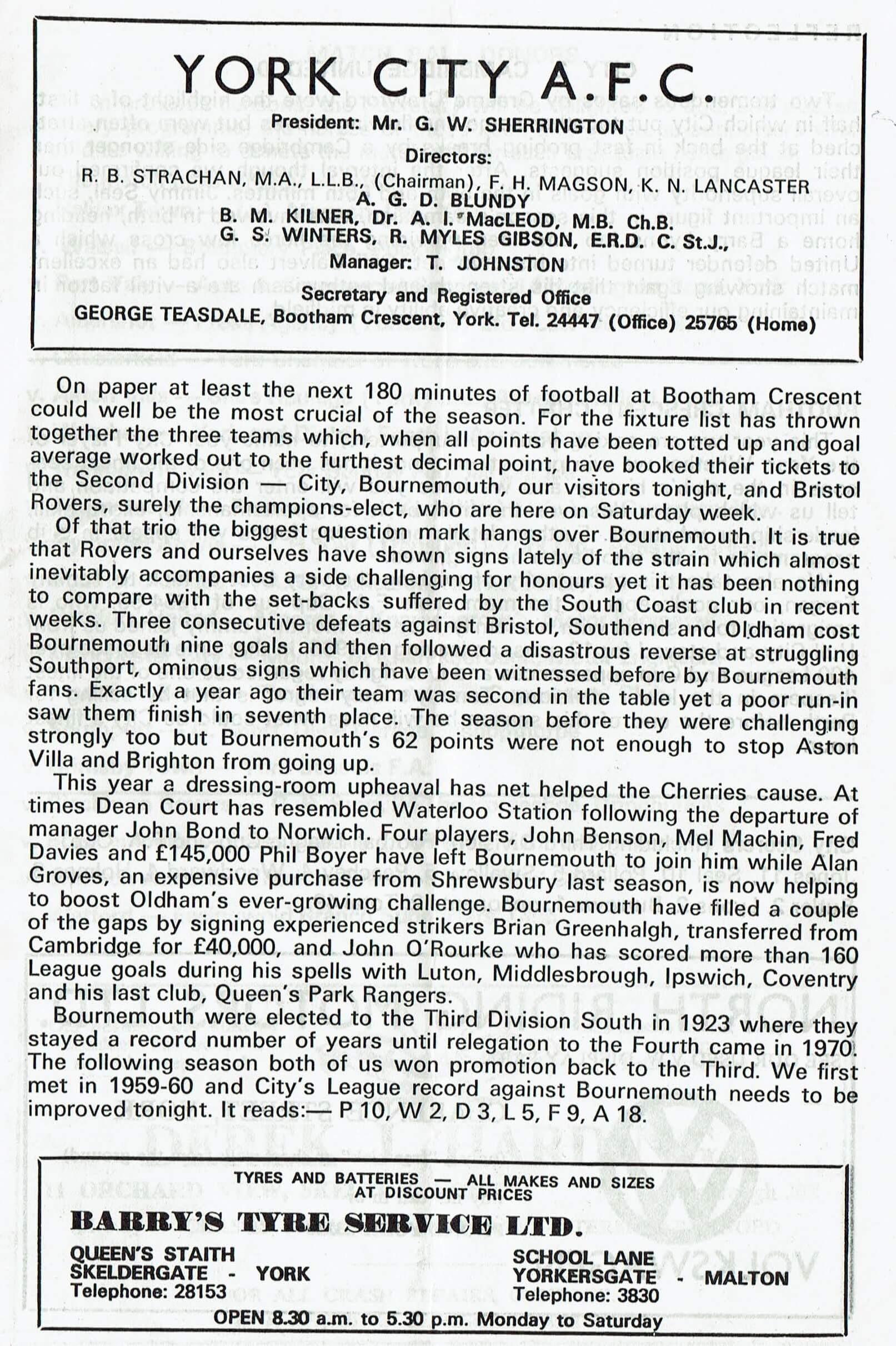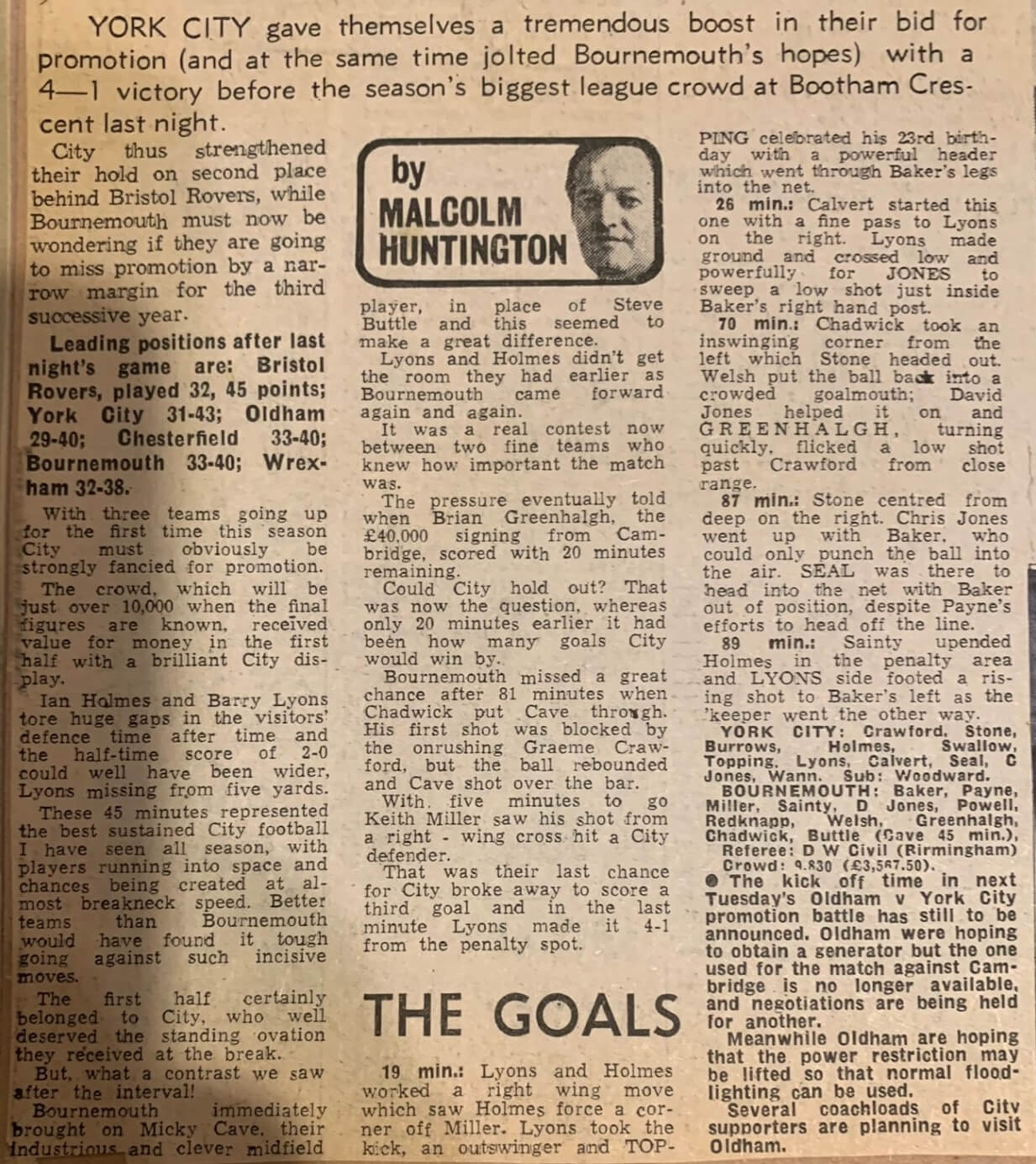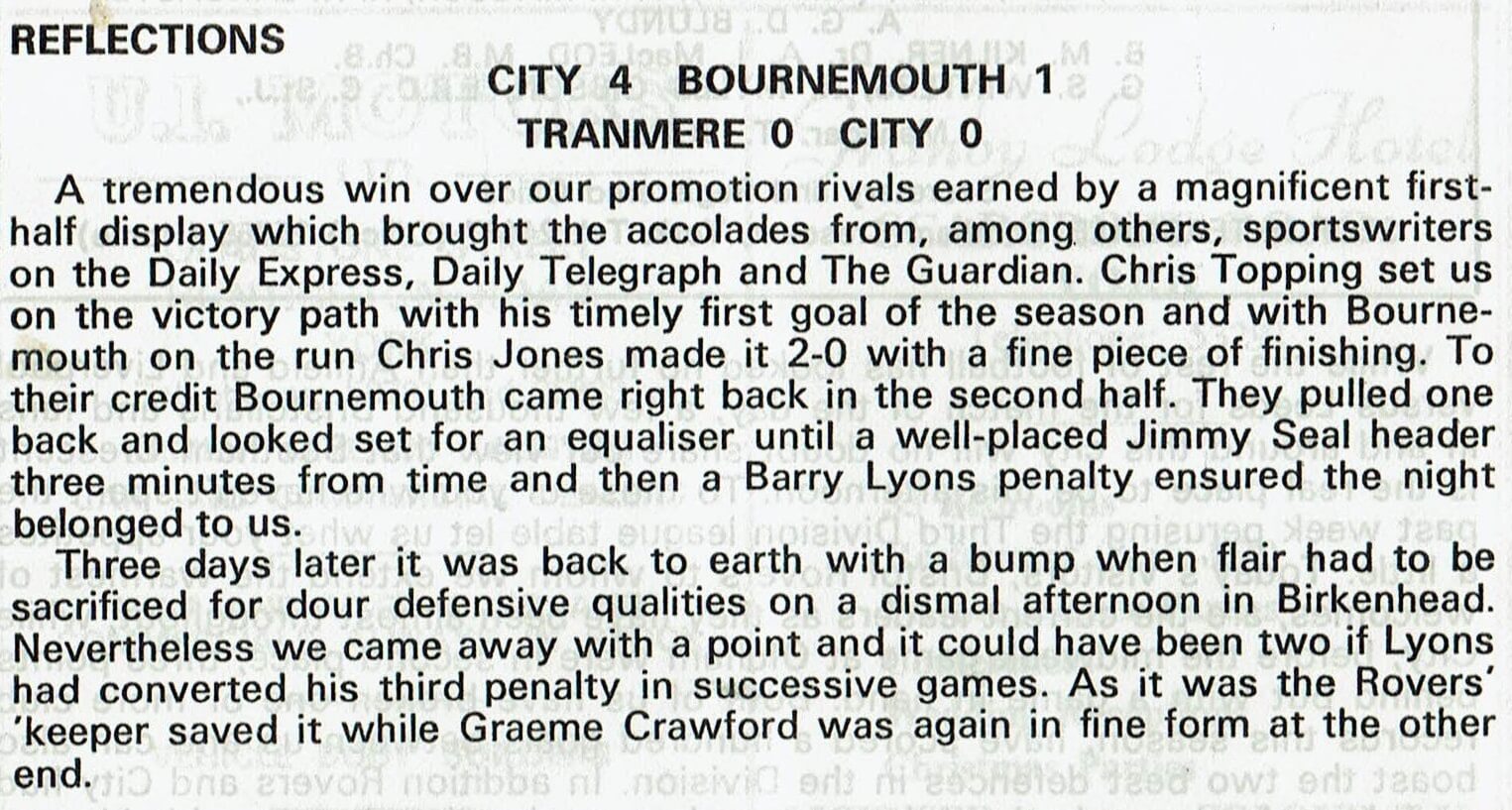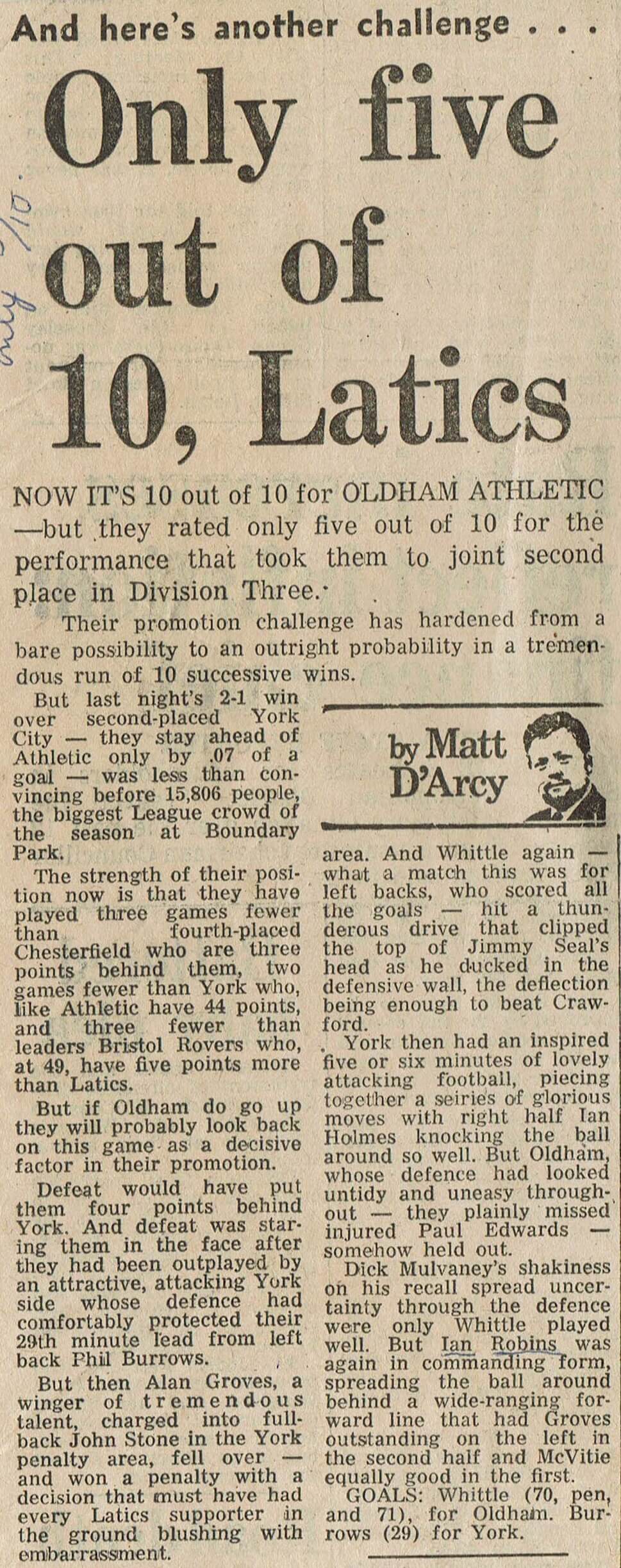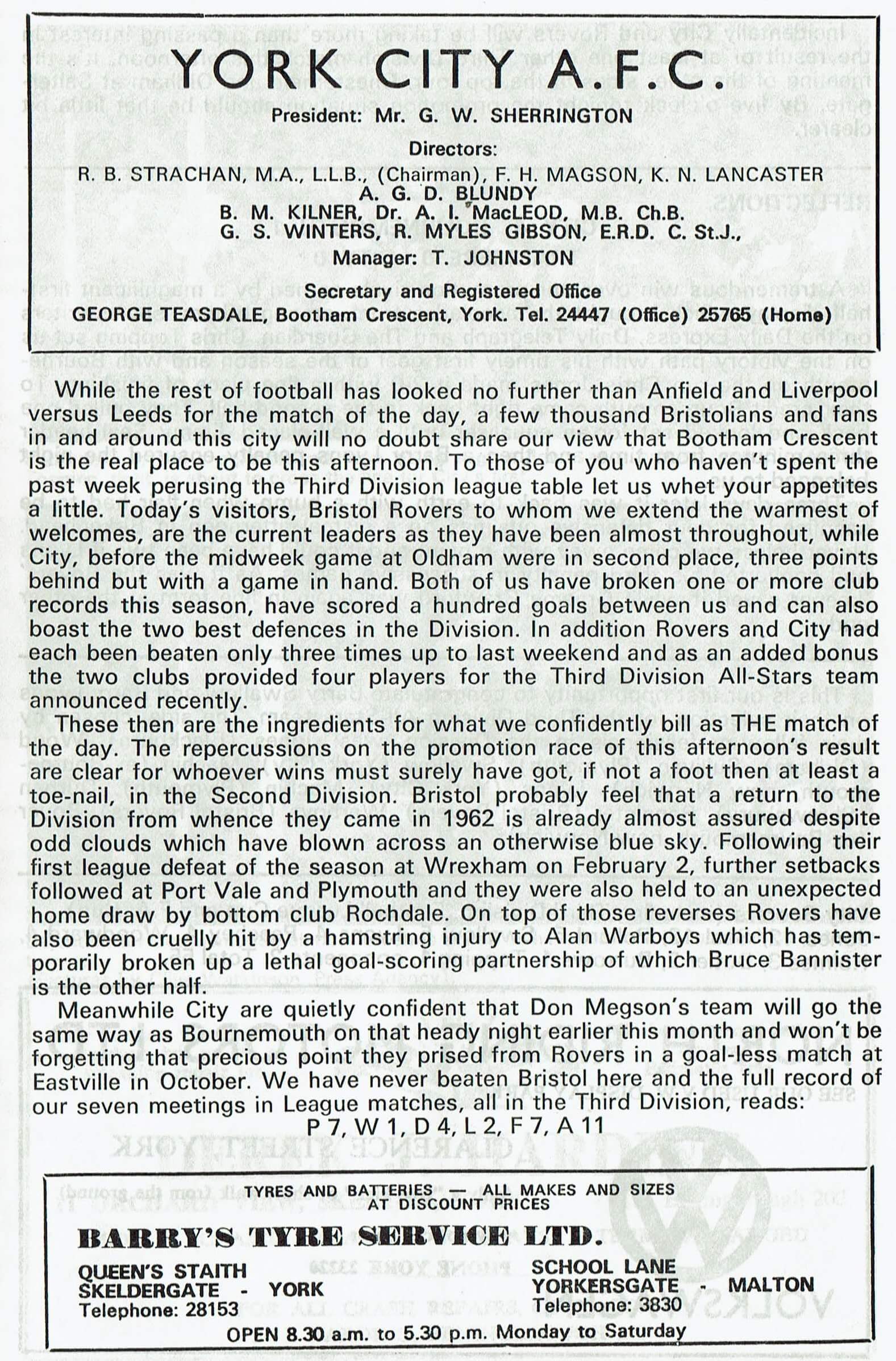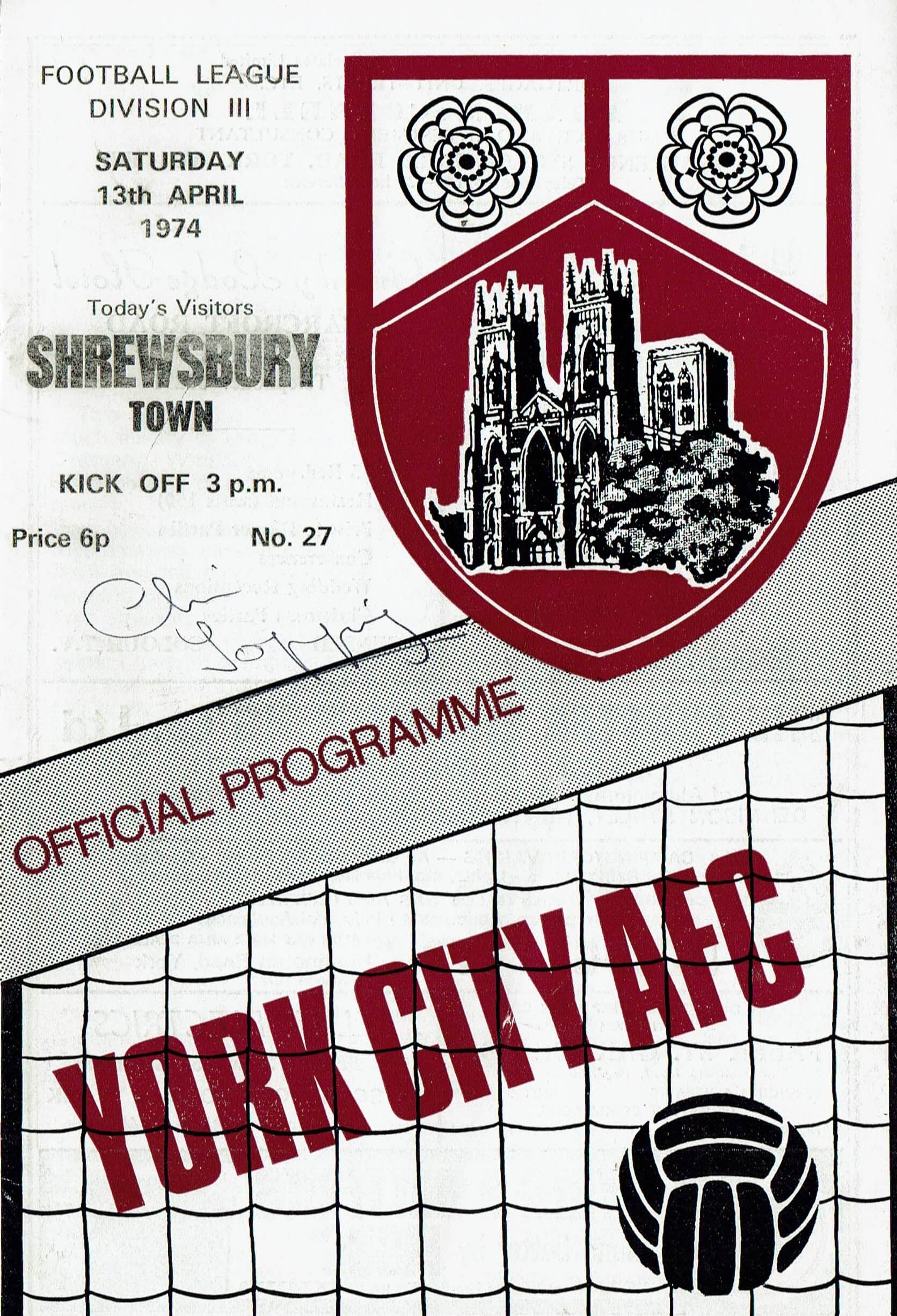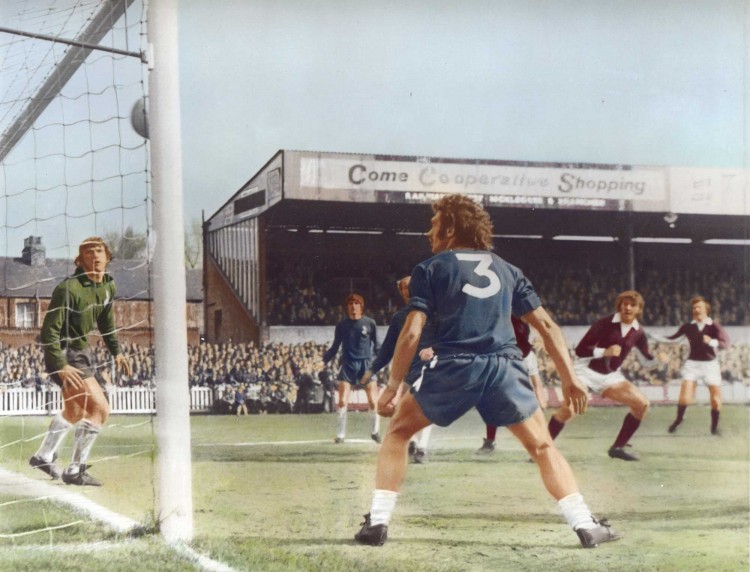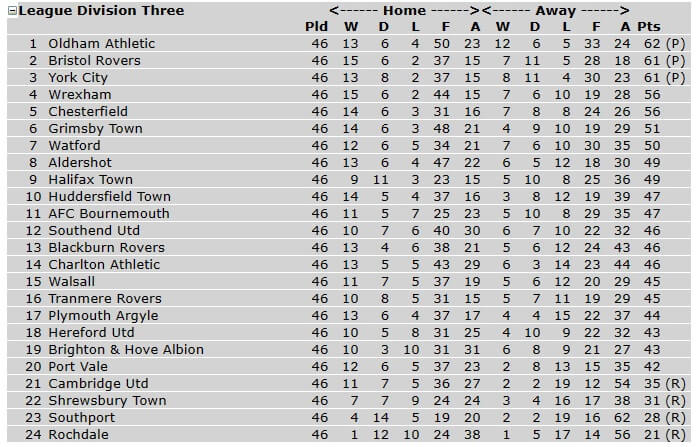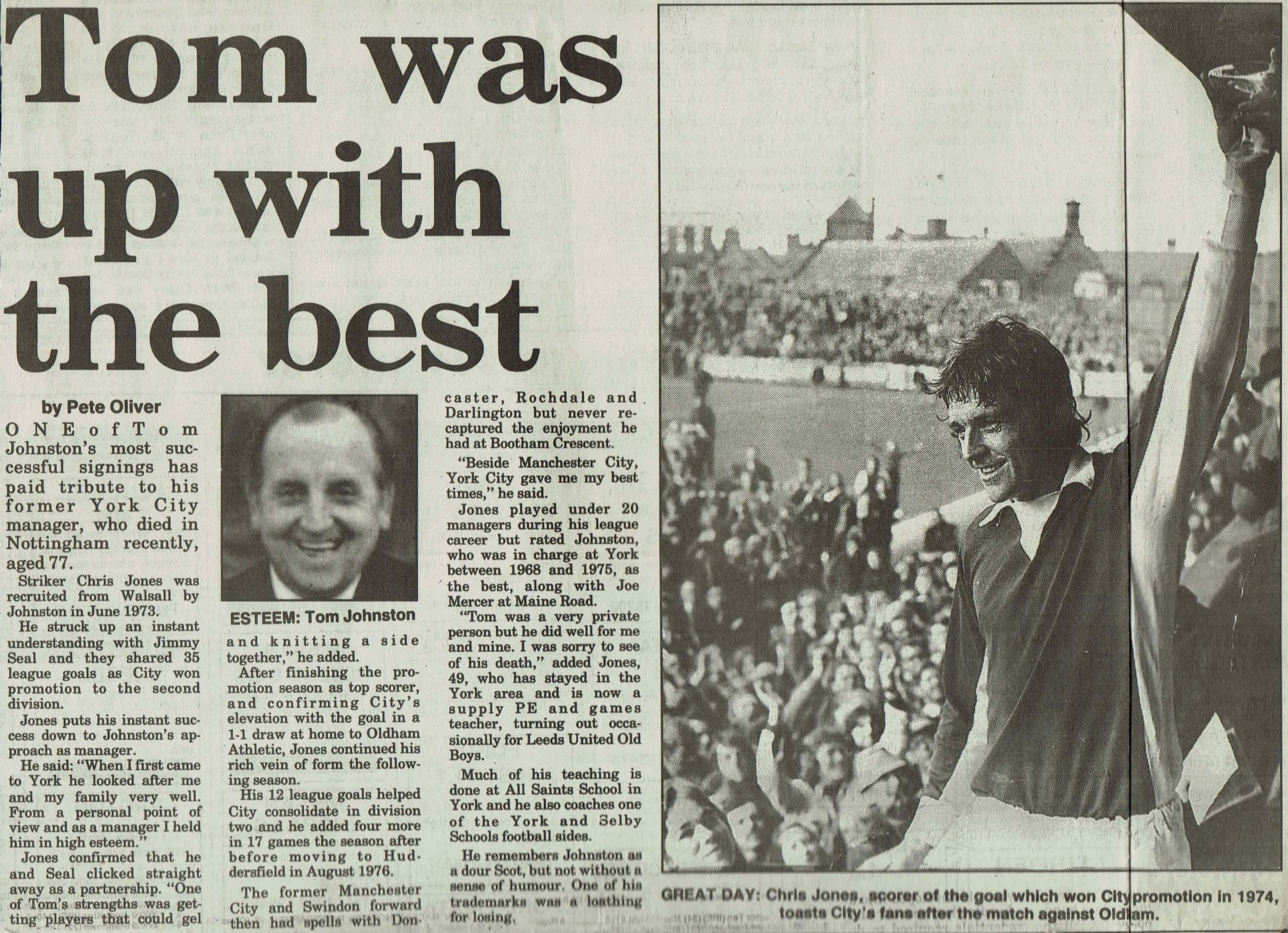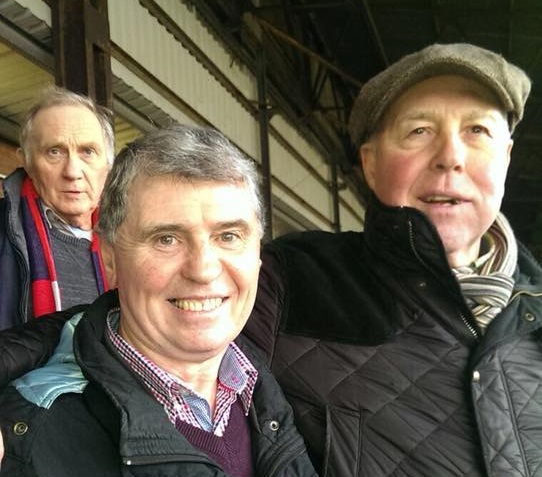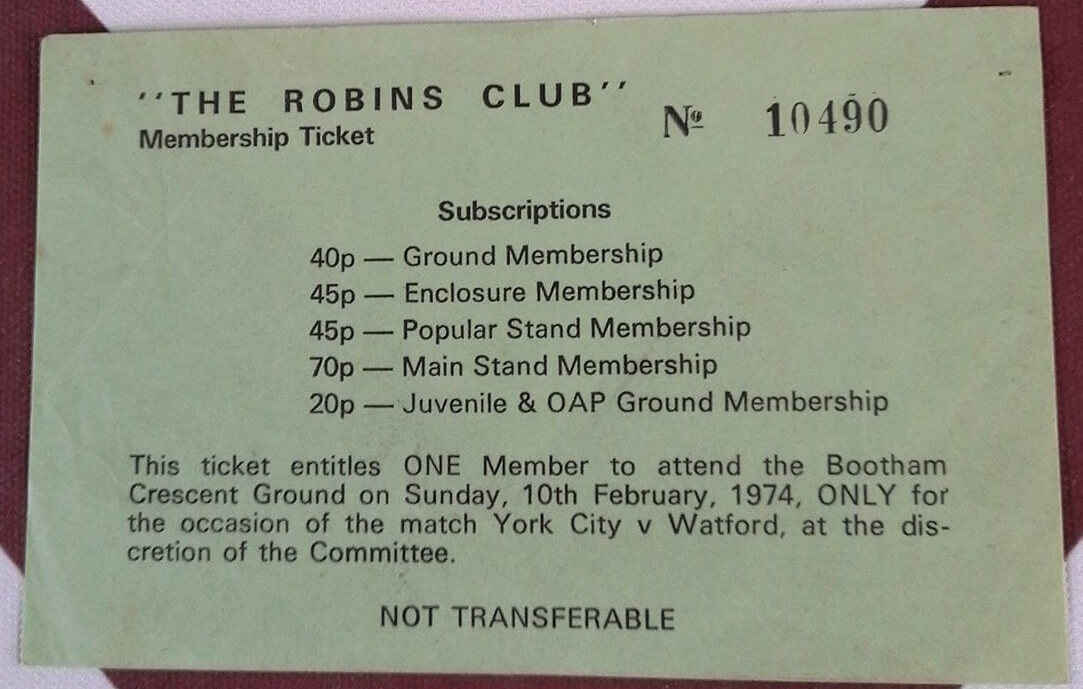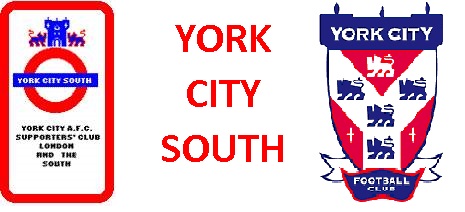

1973/4 Review - Canny Scot (Part 2)
No one looked forward to the 1973/4 season with any real optimism. We had avoided relegation from the real Division 3 (now Division 1) on each of the 2 previous seasons on goal average (The Football League being forerunners of the government's dumbing down policy replaced goal average with goal difference in 1976, making subtraction, not division being the required skill). Entering only our 5th ever as season outside the basement division, another long hard season loomed on the horizon. There had been no significant departures over the summer, indeed we had no really significant players. Our joint top scorers had finished with 7 goals a piece. Joining the squad were another journeyman striker, Chris Jones, from Walsall, veteran Ian Butler the Hull left winger, who a few years previously featured as a part of the Hull City attacking triumvirate who were perpetually knocking on the door of the top flight and Ian Holmes, a young reserve midfielder from Sheffield United.
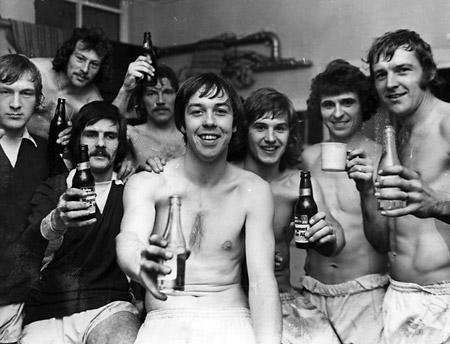
The opening day saw us romp to a shock 4-2 win at Charlton. Even more surprising was that John Woodward scored twice, a light weight, some would say nondescript, others underrated, midfielder signed from Arsenal whose only claim to fame was being thrown over a parked car a few years earlier during a fracas between the teams after an Arsenal European encounter in Rome. Normal service was resumed with 2 1-1 home draws and a 4-0 away defeat in our next 3 games.
Reinforcements were needed. In came Barry Lyons, a veteran right midfielder, initially on loan from top flight Nottingham Forest. The turnaround was instantaneous, 7 points (still 2 for a win) in the next 4 games. Barry Lyons made his loan move permanent for a club record £12,000 fee, smashing the previous record set by Ian Butler just a few months earlier.
The good run got better. Over the next 11 league games, City kept a clean sheet in each game, equalling a Football League record as we surged up the table. The back 4 of John Stone, captain Barry Swallow, Chris Topping and Phil Burrows proved a tight defensive unit, on the rare occasions our goal was threatened, Graeme Crawford provided a more than capable last line of defence in goal. The 11 games resulted in just 10 goals and six 0-0 draws, a sign of where our strength lay. During the 11 games, our opponents missed 9 penalties.
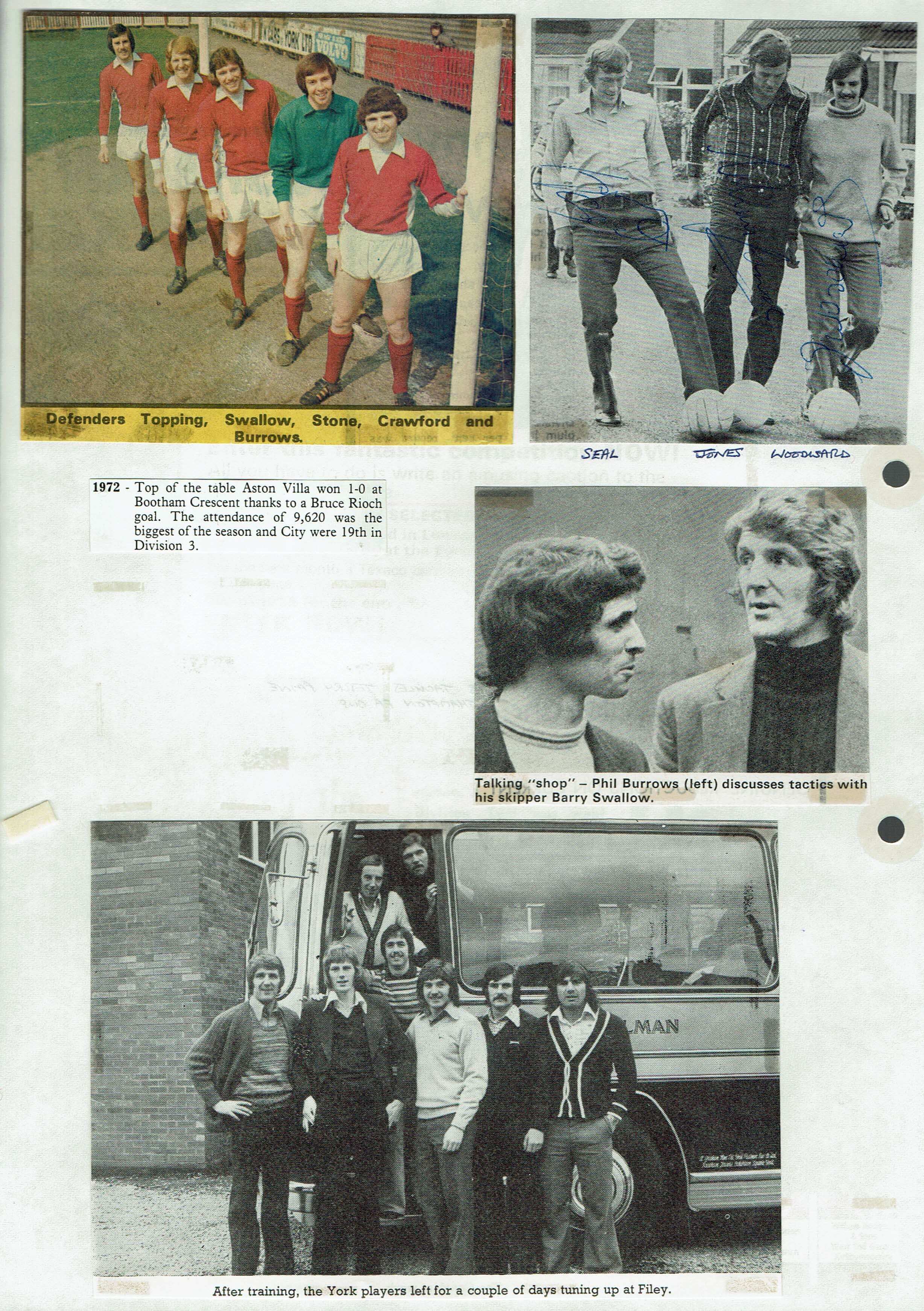
The clean sheets coincided with a Football League Cup run, defeating Aston Villa and Orient, both from the division above City. In Round 4, City held top flight Manchester City to a 0-0 draw in a Wednesday afternoon game, the 3-day working week preventing the use of floodlights for an evening kick off, before going down 4-1 in the replay. Read More - (Man) City Till I Die.
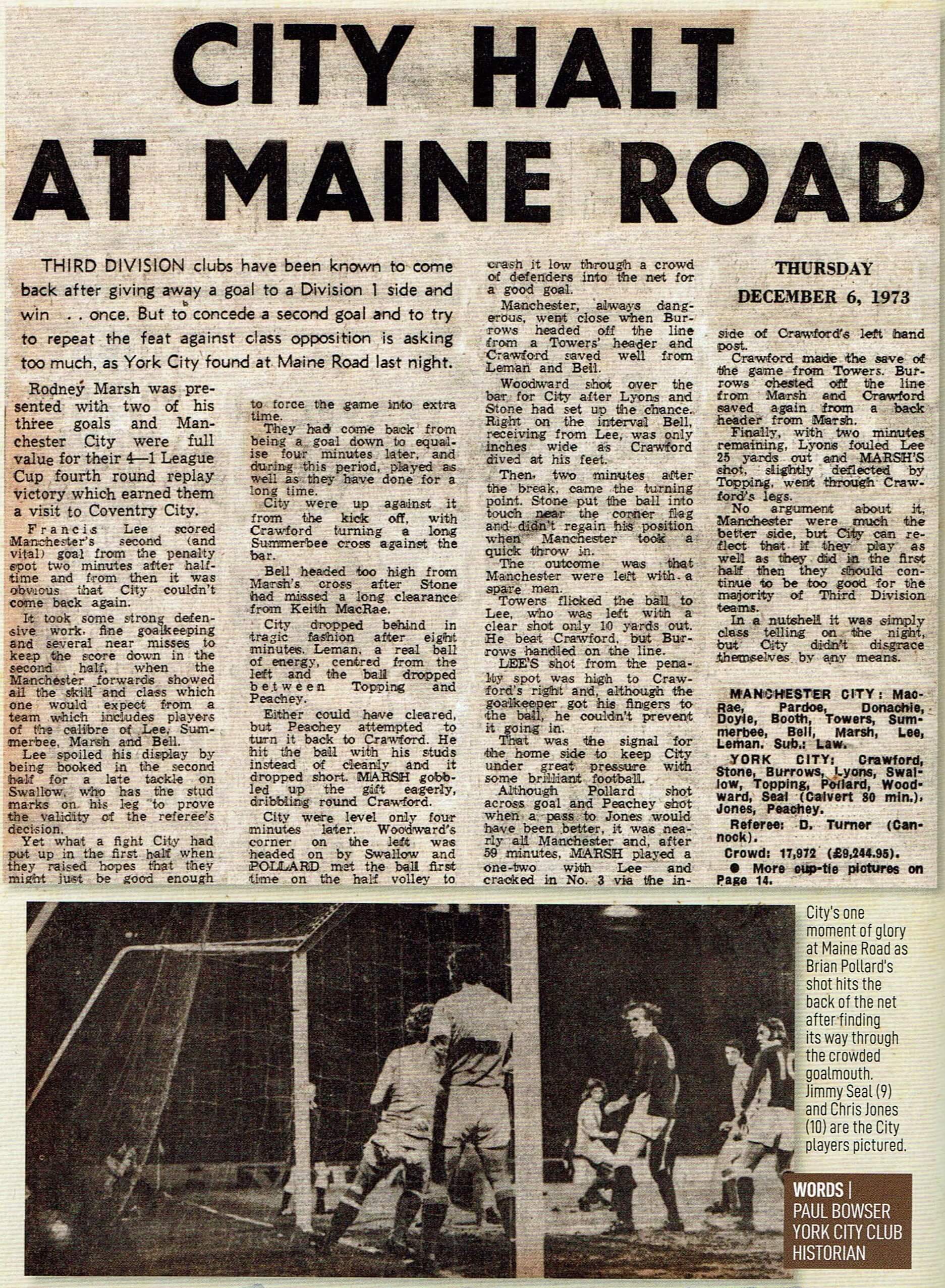
Earlier in November, City made the national news headlines when their visit to Brighton, it ended in a 0-0 draw but all eyes were focus on Brighton's new manager, a certain Brian Clough.
With Barry Lyons and Ian Butler providing guile and leadership in the middle of the park, the likes of Brian Pollard and Ian Holmes provided the attacking thrust with powerful surging runs from midfield, ably supported by Cliff Calvert and John Woodward. Upfront, Jimmy Seal and Chris Jones (later of Radio York fame) vied for the top scorer prize netting 35 league goals between them. Both had their best ever season and never reached the same heights again but proved equally as important to City as the "Smash and Grab" double act of Bannister / Warboys strike force at Bristol Rovers. Having entered the promotion places in November, City were to remain there for the rest of the season. It was to be mid January before City lost only their second league game of the season, a disappointing 1-0 home defeat by Charlton, in a game which ex City star, Eamon Dunphy, ran the game from midfield for the visitors and for whom Keith Peacock scored the ginner, nearly a decade after he'd made history as the first ever substitute in English football.
City's good form continued throughout February, the month saw City's first ever Sunday games, moved back a day due to the 3 day week and power cuts. The first ever was a 3-1 win at Rochdale, even then, one young City supporter noted there was "trouble in the ground, coppers were horrible, they weren't bothered about your safety even when a black lad was waving a big knife about, a right eye opener for a teenager". It was followed by home Sunday games against Watford and Cambridge. The home games saw a big increase on City's average attendance figure from earlier in the season, possibly due to a combination of the novelty of Sunday football (in the days when shops were closed, indeed Sunday was a closed day for many) and City's position in the promotion places.
City entered March with high hopes, was the impossible now possible?
March was to be a crucial month. 8 games, including 5 against promotion rivals awaited City. It started with our first 5 figure home league gate of the season and an impressive 4-1 win over promotion rivals Bournemouth, maybe not quite as emphatic as 4-1 might suggest, and ended with a memorable southern away journey.
Moneybags Bournemouth arrived at Bootham Crescent, their squad cost over £200,000, it included Harry Redknapp amongst a strong ex West Ham contingent and they had Micky Cave prominent in their midfield. They were put to the sword by City’s £35,000 side in a match moved to Wednesday due to the 3 day week and played with the constant sound of the generator, that provided electricity for the floodlights, in the background.
On the following Sunday, it was the annual Professional Footballers' Awards' (PFA) evening. 2 City players, Barry Lyons and Barry Swallow were selected by their fellow pros for the Division 3 side. The side included ex City star Phil Boyer and future City promotion hero Roger Jones.
2 days later, City lost a promotion clash by 2-1 at Oldham, despite going ahead and playing some exciting football, City were pegged back with the local press report headlining their report with "Floodlight Robbery" a reference to the award of a very dubious penalty.
Before the seaside southern trip, Bristol Rovers visited Bootham Crescent in a crunch game. It was a solid all round display from City with Barry Lyons orchestrating City from midfield to negate the threat of the Bristol Rovers goal machines Alan Warboys and Bruce Bannister. Playing against the wind after half time, on 52 minutes, Ian Holmes drove down the left, beating at least 3 defenders before crossing for Chris Jones to fire home from close range. Rovers hit back and had a number of chances before man of the match Ian Holmes hit the woodwork. On 81 minutes, a Rovers penalty appeal was turned down. Shortly afterwards, as Rovers’ frustrations rose, Bruce Bannister was sent off for retaliation after a foul by Chris Topping. With 5 minutes to go, Rovers equalised through Kenny Stephens. Rovers seemed content with a draw and the game was heading that way as injury time approached. Their niggly play, clearances straight out of the ground and time wasting tactics which broke up the game meant there was plenty of time left to play. Barry Lyons forced a fine save as City pressed for a winner. Then, deep into injury time, the referee awarded City a penalty when John Woodward was barged to the ground from a corner. Another commotion followed before, Kenny Stephens argued too much and received a second booking (and a sending off) for his protestations. When order was restored, with the last kick of the game, Ian Holmes held his nerve, the ball twice rolled off the penalty spot, and he calmly slotted home the spot kick to give City a 2-1 win as 7 minutes of injury time were played (when the norm at the time was just one or 2 minutes). It was Ian Holmes' first penalty kick for City, he'd assumed the duty after Barry Lyons had missed City's last penalty a week earlier. before Ian Holmes calmly slotted home the decisive penalty. The win meant promotion was now a real possibility. City fans left the ground with Division 2 clearly in sight whilst Rovers fans left grumbling about the perceived injustices against their team. Graham Crawford recalls post match one of the Rovers players, possibly Bruce Bannister, went into City's dressing room to ask if City's players would speak on his behalf when he appealed his dismissal, he was told where to go. The game saw 2 Rovers players sent off and 6 bookings in a game that erupted in the last 10 minutes, but couldn't really be described as dirty. Although Yorkshire TV cameras were present and the game featured as Sunday's main match on YTV, no footage is believed to exist.
A week later, playing at Southend on Sunday afternoon, City found themselves 3-0 down at half time. In the dressing room, Tom Johnston said nothing. Total silence. Just as the team prepared to return to the pitch for the second half, Phil Burrows rolled up his sleeves (although I always visualise him wearing short sleeves - Ed) and said, “I’ve not come all this effing way to lose to this f@@@@@@ shower”. City recovered to draw 3-3. (Ed - This is a story that Graeme Crawford told to YCS, checking back, we were not 3 down that day). Staying in the south, they journeyed onto moneybags Bournemouth 3 days later and effectively ended the host's promotion hopes with an impressive 3-1 win on Wednesday night. It was first time that City’s squad truly believed that promotion was there for the taking. Incidentally, that trip followed a similar 5 day trip in January of the previous season which resulted in Saturday / Monday wins at Bournemouth and Swansea.
In March, key wins over promotion rivals Bournemouth (twice), Grimsby 2-1 and the televised (highlights) 2-1 feisty win over Bristol Rovers were crucial and cemented our top 3 place and effectively ended the promotion hopes of some of our key rivals. With a very difficult March successfully navigated, City were right in the promotion mix. A two point safety net with just 9 games left to play.
A 1-1 draw with a Plymouth side containing future England striker Paul Mariner and future City manager Booby Saxton didn't dampen City's spirits. Nor did a 0-0 draw at Hereford 3 days later when Graeme Crawford gave a man of the match display to shut out home striker Jim Hinch who as a towering presence and must have caught the eye of Tom Johnston as City made their Match Of The Day debut in the days when MoTD showed around 20 minutes of extended highlights from each of just 2 games, usually Division 1, but occasionally dipping down the leagues and with no goal highlights from any other games. A week later, they showed the clash between City's promotion rivals Bristol Rovers and Oldham.
City entered Easter in second place in the table with 7 games left, one point, 2 or 3 games in hand and a better goal average over the nearest 2 pursuers. Easter saw 3 games in 5 days.
An Easter weekend double over Huddersfield took City to the brink of promotion. The Terriers included Terry Dolan and Bobby Hoy. A surprise home defeat on Easter Saturday against Shrewsbury turned out to be just a blip in the journey.
Promotion was mathematically sealed on April 27 when City drew 1-1 in a home
televised game against Oldham (6 mins 50 seconds in) who were to be crowned Champions.
City had 2 re-arranged game still to play. 3 days later, City visited Halifax and went down to a 2-1 defeat, the game being memorable for a dubious Halifax goal, Graeme Crawford chasing the referee back to the halfway line remonstrating about whether the ball was over the goal line. Many agreed with Crawford and felt it wasn't over the line. One supporter (SM) recalls the game, "I remember Gordon Hunter's goal and also Collins Coaches running a special bus from Barlby, near Selby to the match, as we eagerly anticipated a win and the possibility of promotion as divisional champions. I also a remember a '(bed)sheet collection' at half time to raise money to buy paint, followed by an announcement over the tannoy asking for volunteers to paint the ground". Blanket collections were popular at the time, an outstretched blanket was walked around the pitch at half time, as the penchant for supporters to throw coins at the blanket carriers, rather than into the blanket, their popularity waned and they were replaced by bucket collections (much to the dismay of under used keepers and wingers who would often be seenm collecting mis-directed coins during the second half). A week later, City won their final game of the season at Plymouth.
Alongside Oldham, Bristol Rovers and City, both just one point behind Oldham were promoted, Rovers piping City on goal average for the runners up spot. The rest of the teams were 5 or more points adrift of City in the era of 2 points for a win. It was the first season of 3 up and City finished 3rd. That might do City a disservice as we somewhat struggled over the finishing line, 10 points from the last 10 games, if March's form had continued into April, then we'd surely have been champions. Firsts during the season were our first: Tom Johnston Much of the praise for our success was laid at the door of our manager, Tom Johnston who had been appointed manager in October 1968 and saw us improve our league position in each season he was with us. Never the most popular of managers (the players' mantra being, “we’ll win in spite of him (Johnston))”, his time at York was marked by a player uprising, virulent dressing room infections and a tough stance to contract negotiations as well as 2 promotions thanks to a series of clever, free transfer signings. In his book, Chris Jones makes some interesting observations about Tom Johnston and his coach,
Colin Meldrum. He attributes the foundations of City's success to Meldrum's meticulous pre season coaching drills with the midfield instinctively knowing the runs that Seal and Jones would make. The biggest league crowd to see City that season was the 16,017 who witnessed our 0-0 draw at Brighton (and Brian Clough's first game as Brighton manager in November) whilst at home, 15,583 witnessed our promotion clinching draw against Oldham in April, a couple of hundred more than saw the League Cup game at Bootham Crescent with Manchester City. What Came Next? Phil Burrows never played again for City. A contract dispute saw Tom Johnston allow him to leave for £12,000. No City left back has come even close to matching him since. In the summer of 1974 City signed Peter Oliver (Hearts) on a free transfer to replace Burrows and added Micky Cave (Bournemouth, £18,000) and Jim Hinch (Hereford, £11,000) to our squad, the latter 2 had impressed against City during the season.
On the playing side, Brian Pollard later enjoyed brief success with Watford as they went through all 4 divisions during the Elton John / Graham Taylor days and returned to York to play in our next promotion winning side in 1984. Cliff Calvert left City for over £30,000 and enjoyed a brief top flight career with Sheffield United. The sale of Chris Topping to Huddersfield apparently saved us from bankruptcy in 1978. Johnston resigned in January 1975 for a post at Huddersfield as General Manager. Our momentum carried us through our first ever season in the second tier (then known as Division 2, now The Championship). Largely the same squad carried us to 15th position having been as high as 5th in the autumn. First time league opponents included Manchester United, Aston Villa, West Bromwich Albion, Sunderland, Fulham and Nottingham Forest. We earned a FA Cup replay by drawing away to Arsenal at Highbury before going down 3-1, after extra time, in a replay at Bootham Crescent. Tom Johnston's resignation was announced between the games although he stayed on for the Southampton league match on the following Friday. Wilf McGuinness, the ex Manchester United manager succeeded him. He inherited an ageing squad that had played above itself and he could not sustain our position. Successive relegations followed in 1976 and 1977. History was to repeat itself as both our
1984 and 1993 promotion sides, achieved initial success at a higher level before dropping back into the basement. The curse of City continuing to strike. A team side put together cheaply could not re-generate itself when faced with needing to pay higher transfer fees and wages in a higher division. Graeme Crawford was an ever present for City in Division 2, but fell out of favour with McGuinness and was allowed to leave, although he did return for a second spell.
The pull of York saw many of the team settle in York after their football careers finished.
As per the picture, Grame Crawford and Phil Burrows still follow City, as do the likes of Chris Topping, Jimmy Seal and Chris Jones, Radio York's City match summariser.
John Stone, Dennis Wann, John Woodward and Ian Holmes live a little further afield but are still in touch with their ex colleagues.
Barry Lyons became distant from the club and his former colleagues believing he'd been badly treated following his spell as City manager. Still living in York, he attened LNER with many of his 73/4 colleagues for the Spennymoor game on Good Friday 2022.
Barry Swallow's post playing career has been well documented.
The Team - Where Are They Now?
On April 13, 2024, the 73/4 team were City's hospitality lounge guests, later in the day, they were warmly received when they did a
pitch walk. Little Known Facts: Also see:
